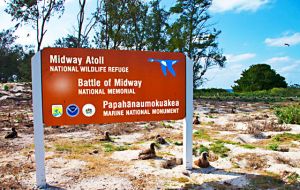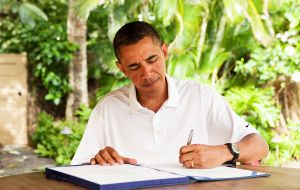MercoPress. South Atlantic News Agency
Obama creates largest protected marine area in Hawaii
 The Papahnaumokuakea Marine National Monument off the coast of Hawaii will ban commercial fishing from more than 1.5 million sq km of the Pacific Ocean.
The Papahnaumokuakea Marine National Monument off the coast of Hawaii will ban commercial fishing from more than 1.5 million sq km of the Pacific Ocean.  Obama will visit the protected area to draw attention to the climate change threat, traveling to Midway Atoll, known for turtles, monk seals, and millions of seabirds.
Obama will visit the protected area to draw attention to the climate change threat, traveling to Midway Atoll, known for turtles, monk seals, and millions of seabirds.  Obama, who was born in Hawaii and spent most of his childhood there, made curbing climate change a central part of his time in the White House
Obama, who was born in Hawaii and spent most of his childhood there, made curbing climate change a central part of his time in the White House  “The best science shows that the ocean can recover, if you allow it to,” said Senator Brian Schatz, who worked with scientists, environmental groups and Hawaiians
“The best science shows that the ocean can recover, if you allow it to,” said Senator Brian Schatz, who worked with scientists, environmental groups and Hawaiians United States President Barack Obama will dramatically expand the Papahnaumokuakea Marine National Monument off the coast of Hawaii on Friday, the White House said, an action that will ban commercial fishing from more than 1.5 million sq km of the Pacific Ocean.
Obama will visit the protected area on September first to draw attention to the threat that climate change poses to oceans, traveling to Midway Atoll - a remote coral reef that was the site of a pivotal World War Two battle and is now known for its sea turtles, monk seals, and millions of seabirds.
Obama, who was born in Hawaii and spent most of his childhood there, made curbing climate change a central part of his time in the White House, which draws to a close on Jan. 20.
Some of his efforts have been blocked by Congress or held up in court challenges. But preserving public space from development has been something Obama can do using his own power, and he had moved to permanently protect more than 265 million acres of land and water even before the expansion in Hawaii.
Obama has also sought to use the star power of his office to raise public concern about climate issues. Trailed by camera crews, he has hiked on an Alaska glacier and walked through the Florida Everglades.
His journey to Midway Atoll, a former naval base that is now a rarely visited refuge, is aimed at sending a hopeful message.
“The best science shows that the ocean can recover, if you allow it to,” said Senator Brian Schatz, who worked with scientists, environmental groups and native Hawaiians to urge Obama to expand the monument.
“As daunting as the problem of climate change is, and as troubling as the situation is with respect to our oceans, they show remarkable resilience, if you give them a chance,” Schatz said.
The monument was first established 10 years ago by former Republican President George W. Bush, who created the world's largest marine reserve at the time, protecting close to 140,000 sq miles of ocean around the Hawaiian archipelago and inspiring a series of similar projects around the world.
The four-fold boost in territory will cover an area with more than 7,000 marine species, including a coral that is the world's oldest-known living organism at 4,265 years old.
“We think of Papahnaumokuakea's original designation as a catalyst, and we're hoping it will be again,” said Seth Horstmeyer, a director with Pew's Global Ocean Legacy project. Only about 3% of the world's oceans have similar protections, according to Pew.




Top Comments
Disclaimer & comment rules-

-

-

Read all commentsThis is not preserving it from development, it is preventing islanders from living of their local resources.
Aug 29th, 2016 - 09:05 am 0Obama seems to be trying to compete with Chile in reducing access to resources:
Aug 29th, 2016 - 01:52 pm 0“Chile Creates Largest Marine Reserve in the Americas”
http://news.nationalgeographic.com/2015/10/151005-desventuradas-islands-marine-protected-area-conservation-science/
Small irony that the affected area includes the islands called “The Unfortunates.”
The move has contributed to the Chilean's president having the lowest level of approval of any in their history: 15 percent and falling.
And why should this matter to an Argentine?
Aug 29th, 2016 - 02:00 pm 0Commenting for this story is now closed.
If you have a Facebook account, become a fan and comment on our Facebook Page!